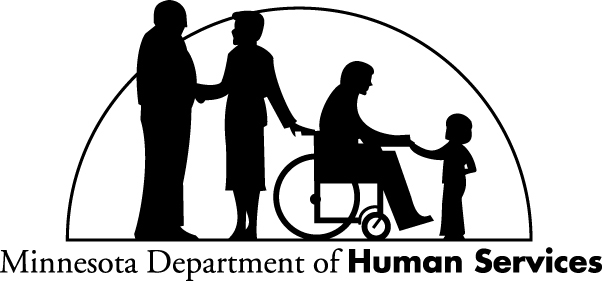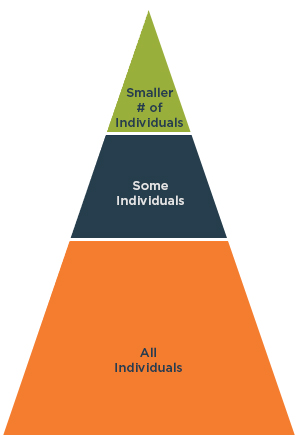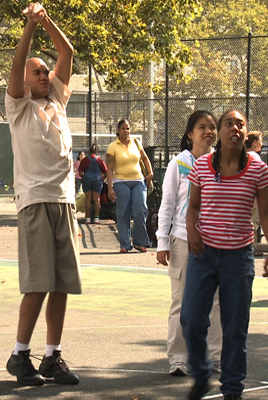Lesson #2: Positive Support Strategies and Person-Centered Planning
Lesson #2: Positive Support Strategies and Person-Centered Planning

Lessons in the PSR Course:
There are five lesson in this course.
- Introduction to the Positive Supports Rule (PSR)
- Positive Support Strategies and Person-Centered Planning
- Prohibited and Allowed Procedures in the PSR
- The Roles of Professionals in the PSR
- Documentation and Reporting in the PSR
Lesson #2 Description and Learner Objectives
Lesson #2 Description: This lesson will help you more clearly understand the purpose, value, and definitions of positive supports and person-centered planning requirements in the Positive Supports Rule (PSR).
After completing this module, you will be able to:
- Describe positive support strategies as defined by the PSR
- Describe the role of person-centered planning as a key component of positive supports as defined by the PSR.
Positive Support Strategies
- Subp. 40. Positive support strategy.
- “Positive support strategy” means a strengths-based strategy based on an individualized assessment that emphasizes teaching a person productive and self-determined skills or alternative strategies and behaviors without the use of restrictive interventions.
DHS Positive Support Rule: MN Rule 9544.0020
Understanding Positive Support Practices*
Practices that include the following characteristics:
- Person-centered interventions that demonstrate respect for human dignity,
- Evidence-based, or promising practices
- Include strategies for ongoing assessment and monitoring at individual and organizational levels
- Implement in combination with more than one practice
* This definition draws from more than just the Positive Supports Rule.
A Public Health Approach to Positive Support
Public health models look at prevention of problems as well as response. Click on each heading to learn more.

- Tertiary Prevention Intensive & Individualized Planning- For Few
-
“Carefully implemented and monitored strategies when people need individualized support.” “Listening very closely to the person.” “Helping the person make their best choices and succeed.”
- Secondary Prevention Early Identification and Intervention- For Some
-
“What we do when we notice pockets of problems. How we provide extra help for enhanced skills for those who need it.” “Ways of recognizing when what we are doing is not working and changing it.”
- Primary Prevention Universal Intervention Strategies- For All
-
“The way we treat each other.” “The things we do for anyone.” “Ensuring choice, control, direction.” “Ensuring respect and dignity.” “Gathering the right data to make good decisions.”
More on Positive Support Strategies
Positive support strategies must be incorporated in writing into existing treatment, service or other individual plans required of the provider when supporting a person to change interfering behavior. To develop and implement positive support strategies, service providers must complete an individualized strength-based assessment that guides selection of approaches that:
- are evidence based,
- are person-centered,
- are ethical,
- integrate a person into their chosen community,
- are the least restrictive to the person, and
- are effective.
Examples of Potential Positive Support Approaches

- Applied Behavior Analysis (ABA)
- Cognitive Behavior Therapy (CBT)
- Dialectical Behavior Therapy (DBT)
- Integrated Dual Diagnosis Treatment (IDDT)
- Motivational Interviewing
- Multi-systemic Therapy
- Person-Centered Thinking and Planning (PCT &PCP)
- Positive Behavior Support (PBS)
- Response to Intervention
- Systems of Care
- Trauma-Informed Practices
- Wraparound Planning
Person-Centered Planning
- Subp. 37. Person-centered planning.
- “Person-centered planning” means a strategy used to facilitate team-based plans for improving a person’s quality of life as defined by the person, the person’s family, and other members of the community, and that focuses on the person’s preferences, talents, dreams, and goals. It is part of a family of approaches to organizing and guiding community change in alliance with people with disabilities and their families and friends.
If you want to learn more about person-centered planning practices and approaches you can go to the course on person-centered planning in the College of Direct Support.
Service Delivery and Person-Centered Planning
According to 245D, person-centered service planning and delivery must identify and support what is important to the person as well as what is important for the person. It must include preferences for when, how, and by whom direct support service is provided. It must use the information gathered to identify outcomes the person wants and it must respect each person’s history, dignity, and cultural background.
In addition, planning must support self-determination, the development of skills, protection of rights, opportunities for ongoing learning, and a balanced approach to risk, and do so in a the most inclusive manner possible.
Service Delivery and Person-Centered Planning

The Positive Supports Rule requires that person-centered planning must look at the most integrated setting for each person. This means:
- Include life planning with the person placed at the center of the planning process and the person’s preferences and choices reflected in the selection of services and supports;
- Involve the person directly with their own community, network of connections, and close personal relationships that build on the person’s capacity to engage in activities and promote community life; and
- Identify goals to support the person in the most integrated setting.
Service Delivery and Person-Centered Planning
Listen to Christopher share his experience.
Incorporation of Person-Centered Principles
The PSR requires license holders to evaluate if they are incorporating principles of person-centeredness into services provided at least every six months. The following aspects of service need to be evaluated in that process.
Whether the plan and services:
- reflect the person’s strengths, preferences, daily needs and activities, and
- support accomplishment of their goals
In addition, services should meet all state (245D) and federal (HCBS) requirements for planning and services.
Lesson #2- Check Your Understanding & Review
-
Positive supports are any support that helps someone change their behavior for the better.
- True
- [correct] False
-
Positive support and positive behavior support are the same thing.
- True
- [correct] False
-
Positive support must be person-centered and evidence based.
- [correct] True
- False
-
For people who are covered by the PSR, license holders must evaluate how person-centered the services are at least every 6 months.
- [correct] True
- False
-
There are a few specific types of person-centered planning listed and allowed in the PSR.
- True
- [correct] False
Lesson #2 Conclusion
- Positive support strategies must be:
- based on an individualized and strengths-based assessment;
- emphasizing development of productive and self-determined skills, or alternative strategies and behaviors;
- without the use of restrictive interventions.
- Person-centered planning is required as part of developing a service plan that includes positive support strategies. However, providers must assure that services are actually delivered in a person-centered way through regular evaluation.
Lesson #2 Conclusion
- There are no specific forms of person-centered planning required in the PSR. However, any plan must comply with expectations laid out in 245D and federal rules and:
- Identify what’s important to and for the person and how they want to balance these aspects of their lives
- Include the person’s strengths, preferences, and interests
- Identify he person’s goals
- Do so in the most inclusive setting possible.
There is a test linked to this lesson. You must take the test to receive credit for completing the lesson. Once you have finished reviewing this lesson, close the pop-up window and go back to your lesson assignment list. Then click on the title of the lesson you just completed, you will be taken to the welcome page again. A blue button "Take the Test" will have appeared. Click on it to take the test. Once you complete, submit, and pass the test, the lesson will be credited as complete.